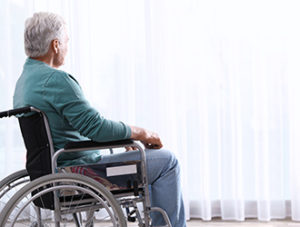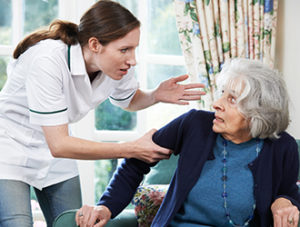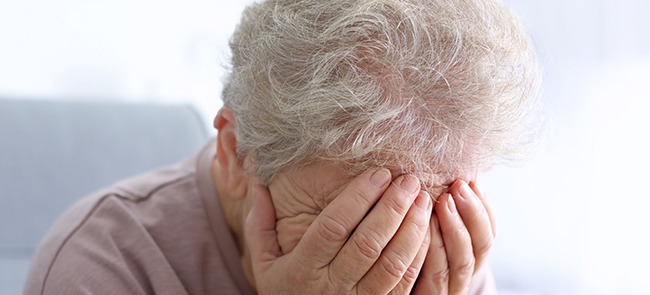Philadelphia Nursing Home Abuse Lawyer

Any nursing home resident who sustains injuries as a result of the negligence or wrongful conduct of anyone at a nursing home has important legal rights.
The law gives nursing home abuse victims in assisted living facilities the right to take legal action and seek compensation for any physical, emotional, and financial injuries suffered.
The Levin Firm Personal Injury Lawyers in Philadelphia understands how nursing home residents can incur severe and lasting injuries due to abuse.
We are here to seek justice and financial recovery for our clients. Please discuss a possible case with our experienced Philadelphia nursing home abuse attorneys today.
Many of us worry about the health and safety of our aging grandparents, parents, spouses, relatives, and friends.
We want to be there to help monitor their health, provide companionship, offer home-cooked meals, and assist in their day-to-day activities.
Sometimes we reach a point where we need help meeting our loved one’s daily needs. Nursing homes staffed with competent medical professionals offer care and comfort to over 1.5 million disabled and elderly Americans who can no longer live on their own or in their own homes.
Most nursing homes are staffed by experienced, capable professionals and offer excellent care. Sadly, however, some nursing homes fall short.
The National Center on Elder Abuse (NCEA) reported almost 188,600 complaints regarding abuse, neglect, or exploitation in a single year in the United States.
However, the NCEA also found nursing home abuse and injuries are grossly underreported, so the actual numbers likely run much higher. Abuse can take different forms and can be committed by nursing home staff, other residents, or even visitors to the facility.
Our loved ones are particularly vulnerable to suffering both physical and emotional damage as a result of nursing home abuse. Whether it comes as the result of intentional physical assault or simply a lack of attention, nursing home abuse is inexcusable.
Abuse and neglect can have severe consequences to the resident, including serious bodily injury, depression, and premature death. Read on to learn more about nursing home abuse and your legal options from our experienced Philadelphia personal injury attorneys.
Types Of Nursing Home Abuse
 Nursing home abuse cases can vary significantly from one victim to the next.
Nursing home abuse cases can vary significantly from one victim to the next.
In some cases, a staff member may negligently forget to provide the necessary care for a resident. In others, a staff member may lose their temper and physically or verbally lash out at a resident.
Other cases involve staff providing inadequate security or supervision and allowing others in the facility who hurt your loved one. In any case, the potential for severe injuries is high.
The following are some types of nursing home abuse:
- Neglect –Nursing homes have the duty to provide for a resident’s basic needs, which include having proper shelter, sustenance, a sanitary environment, necessary medical care, and more. Sometimes, staff communication breaks down or certain staff members neglect their duties. When residents do not have adequate food, water, hygiene assistance, shelter, or medical treatment, they can suffer serious injuries.
- Physical abuse –People can commit physical harm to others in almost any situation – and nursing homes are no different. Staff or other residents may hit, kick, bite, punch, wrongfully restrain, or otherwise cause physical injury to nursing home residents. Older residents are particularly vulnerable to assaults and injuries, as they may not be strong enough to defend themselves. Injuries may require serious medical treatment and may even put a resident’s life in danger. Such assaults can cause mental trauma, as well.
- Emotional abuse –Not all abuse causes physical injuries, as emotional abuse can be seriously harmful to a victim. Staff members may belittle, criticize, threaten, or make other emotionally-harmful statements to residents that can result in serious emotional scars. Residents may also be wrongfully isolated from others, may be forced to live in fear, or maybe emotionally manipulated and traumatized in other ways.
- Sexual abuse –Not many people discuss the possibility of sexual abuse against elderly nursing home residents, though this happens more often than you may believe. Residents may be incapable of defending against a sexual attacker and thus are completely vulnerable to unwanted sexual exposure, touching, or assault. Needless to say, sexual abuse can cause severe physical and mental trauma.
Any type of nursing home abuse can result in lasting injuries and effects for a victim. Nursing homes should be held fully liable for the wrongful or negligent acts of staff members or others at the facility, as well as failures to provide appropriate levels of care.
Has Your Loved One Suffered Injury?
The lawyers at The Levin Firm Personal Injury Lawyers understand that nursing home abuse is underreported. Our attorneys know that some residents are fearful that the nursing home abuse will continue or escalate if the nursing home abuse is reported. Others are ashamed to admit having been victims of nursing home abuse, or perhaps they do not think anyone will believe them. Other residents may not have the cognitive capacity to understand or recall how they were injured. As a result, it is important to be aware of possible signs that your loved one may be a victim of nursing home abuse or neglect.
Signs of nursing home abuse or neglect can include any of the following:
- Bedsores
- Broken bones, cuts, bruises, or any other physical injury
- Repeated injuries without proper explanation
- Acting fearful around staff members or other people in general
- Marks on wrists or ankles indicating restraints
- Unclean resident rooms or bathrooms
- Odors or stains on your loved one’s clothing or bed sheets
- Changes in hygiene
- Skin disorders
- Unexplained weight loss or gain
- Untreated medical conditions
- Diagnosis of sexually-transmitted diseases
- Injuries to genital areas
- Regression into a mute or childlike state
- Staff members who discourage one-on-one visits
- Behavioral changes
- Emotional breakdowns
If you notice any of these warning signs, or anything else out of the ordinary, you should not hesitate to discuss your best course of action with a skilled nursing home injury attorney.

What To Do If You Suspect Elder Abuse
If you suspect that an elderly person has been abused or neglected by their nursing home, you should take action. Here’s what to do:
- Verify the story. Your first step should be to see if the elderly person is telling the truth. Get clear about what your relative or friend is saying by going over the problem with them. If you can, check with other residents of the nursing home who seem to be coherent. Also gather medical records, or take photos, of recent injuries or prescriptions.
- Consider removing the elderly person to another facility. If you are worried about the safety of a nursing home resident, assist them in leaving the nursing home immediately.
- Inform the authorities. Inform the police or district attorney. In some states, such as California, you are required to report elder care abuse when you learn it has occurred. If the district attorney determines that the evidence that you present rises to the level of criminal behavior, the state will file charges against the nursing home.
- File a complaint with the appropriate agencies. File a complaint about the nursing home to your state’s department of social services, adult protective services, or elder protective services.

What Damages Am I Entitled To?
If you are considering filing a nursing home abuse claim, it is important to speak with an experienced attorney. In the event that you file a complaint against a nursing home, you will need to present all evidence of the losses or suffering that resulted from the nursing home’s conduct. Additionally, to strengthen your claim, you should provide as much information on the following types of damages:
- Necessary and reasonable medical expenses;
- Actual past expenses for physician, hospital, nursing and laboratory fees, medications, prosthetic devices, etc.;
- Anticipated future expenses;
- Harm from conditions caused by prolonged immobilization;
- Pain and suffering from physical injuries;
- Pain and suffering reasonably likely to occur in the future;
- “Phantom pain” and other subjective pain that may not be readily apparent to others;
- Mental anguish;
- Harm from loss of sleep;
- Past and future impairment of the ability to enjoy life.
Other Damages
- Mental Suffering: Monetary damages may be awarded for a nursing home residents or their survivors, for pain, suffering, disfigurement, and impaired enjoyment of life. These damages are awarded for both physical and mental pain. Mental suffering for which one may recover damages can include the following:
- Fear of the consequences of an injury while awaiting help;
- Fear experienced in the period between realizing an incident likely to cause injury was going to occur and the time of occurrence;
- Fear experienced after an injury about what else could have happened;
- Anxiety about one’s physical health and future well-being;
- Fear of the need for future surgery as a result of one’s injuries;
- Fear of increased vulnerability to future injury;
- Post-traumatic stress disorder.
- Disfigurement: The elderly are entitled to damages for disfigurement caused by another. Disfigurement can include scars, amputation, hair loss, or any other injury that affects one’s appearance. The dignity of senior citizens should be respected and preserved whenever possible, and if it is affected by a disfiguring injury, an appropriate complaint against the nursing home for monetary damages should be made.
- Loss of enjoyment of life: The loss of the enjoyment of life is generally understood to mean one is deprived of the ordinary pleasures of living a full life. With an elderly client, this could mean the ability to play with one’s grandchildren, to walk and exercise as one did prior to an injury, to communicate meaningfully with others, or to engage in pastimes one previously enjoyed.
- Shortened Life Expectancy: Courts generally do not recognize shortened life expectancy as a separate injury, but it may be considered in determining the seriousness of an injury, decreased earning capacity, pain and suffering, and mental suffering from the knowledge that one’s life will be shorter. Jurors are typically told to determine a plaintiff’s future damages based on standard life expectancy tables; however, due to improvements in medical science and living conditions over the years, an attorney might argue that life expectancy was or is actually greater than the standard tables would indicate.
- Punitive Damages: Punitive damages may be awarded in cases where it is shown that a nursing home engaged in malicious or reckless conduct. In such cases, it is sometimes argued that the nursing home resident was deprived of his or her statutory rights.
Philadelphia Nursing Home Negligence FAQ
We all worry about our aging or vulnerable loved ones. When we entrust their care to a nursing home or long-term care facility, we want to make sure they receive the assistance, companionship, and respect they deserve.
Nursing homes offer comfort and care for our elderly and disabled family members when they can no longer care for themselves.
Most do a fine job of looking after their residents. But, unfortunately, not all of them. Sometimes their services fall short, and their vulnerable residents suffer severe harm.
In this blog post, we answer some frequently asked questions about nursing home negligence in the Philadelphia area.
To learn more about your legal rights as a nursing home resident who has been a victim to negligence in a Philadelphia nursing home or long-term care facility, contact an experienced nursing home negligence attorney at the Levin Firm today for a free case evaluation.
1. What exactly is nursing home negligence?
Nursing home negligence is a type of abuse of a resident of a nursing home or long-term care facility. Because most residents of these facilities are elderly, you may also hear of abuse at a Philadelphia nursing home referred to as elder abuse.
According to the Centers for Disease Control and Prevention (CDC), elder abuse is defined as an intentional act or a failure to act by a caregiver or another individual who is in a relationship involving an expectation of trust and who creates a risk of harm to an older individual.
In a nursing home or long-term care setting, abuse of elderly and/or vulnerable residents can take several forms:
- Physical abuse: When nursing home staff intentionally use any force (hitting, beating, shoving, choking, or even slapping) to harm their residents.
- Emotional abuse: When nursing home staff inflict emotional harm through their words and/or actions, such as by threatening residents, isolating them, or punishing them.
- Sexual abuse: Any non-consensual sexual contact or interaction involving a resident of a nursing home, perpetrated by staff or a fellow resident.
- Financial abuse: When caregivers abuse their access to residents and the residents’ personal information to commit financial crimes such as fraud or identity theft.
- Negligence: Unlike the four categories of abuse above, negligence occurs when nursing home staff or administration fail to take reasonable steps to provide a minimum standard of care to residents, resulting in harm to those residents. Negligence can take many forms, including failure to assist residents in daily routines, failure to provide adequate nutrition or hydration, understaffing, failure to administer or monitor medications, and failure to care for treatable health conditions.
Any harm that comes to a resident of a nursing home in Philadelphia is absolutely unacceptable. If you suspect any type of abuse of a nursing home resident, take steps to ensure the resident’s immediate safety if necessary, then contact an experienced nursing home abuse attorney right away.
2. What rights do Philadelphia nursing home residents have?
Any resident in a Philadelphia nursing facility has a right to be treated with respect, consideration, and dignity.
This means freedom from physical and mental abuse and involuntary seclusion, physical or chemical restraints, and corporal punishments for convenience or discipline.
Restraints should only ever be used on a resident based on a written order by a qualified doctor, and only if necessary to protect the safety of the resident or others.
In addition, Philadelphia nursing home residents have legal rights to security and self-determination.
These rights, as described on the Medicare website, include:
- The right to be free from neglect, discrimination, and abuse.
- The right to medical care and to choose their physician.
- The right to receive written information in a way that the resident can understand the services offered, the costs of the services, the nursing facility expectations for their residents, and their rights under the law.
- The right to be involved in their care planning.
- The right to refuse or accept who visits them.
- The right to determine reasonably whether they want to wake up, eat, or go to bed.
- The right to not only participate but form resident groups and participate in their activities.
- The right to know in writing of planned discharge or transfer.
- The right to their finances.
- The right to make complaints without worrying about retribution.
If you suspect a violation of any of the rights above, do what you need to do to ensure the nursing home resident’s safety, then call an experienced Philadelphia nursing home injury lawyer.
3. What happens if a Philadelphia nursing home resident complains of abuse?
Today, all the states, including Pennsylvania, have procedures for reporting allegations and complaints of nursing home neglect and abuse.
Some people have a legal obligation to report suspected abuse or neglect to authorities. Others may not have a legal obligation, strictly speaking, but have a moral obligation to do so in appropriate cases.
Reporting abuse or neglect to authorities typically sets in motion an official investigation process that could result in fines, penalties, and even criminal charges against the nursing home or individual staff members.
Be aware, however, that complaining through official channels, without the assistance of an experienced nursing home abuse attorney, may not always achieve adequate or timely results for the vulnerable resident.
In fact, it may get in the way of the resident’s, and your own, legal rights to receive compensation for injuries and losses.
To ensure full protection of the resident’s rights, we encourage anyone who suspects that nursing home negligence has harmed a loved one to first take steps (if necessary) to protect the resident’s health and safety, and then to call an experienced Philadelphia nursing home negligence attorney immediately.
Skilled nursing home negligence lawyers can act quickly to develop a legal strategy to protect the resident’s rights.
4. Why does it seem like abuse and neglect are so common in Philadelphia nursing homes?
Because, sadly, too many Philadelphia nursing homes fall short of the standard of care they have a legal and moral obligation to deliver far more often than they should.
Nursing home abuse is nothing new; according to the National Center on Elder Abuse, 1 out every 10 elderly Americans experiences abuse in the nursing home facility where they reside. Why are abuse and neglect so common in nursing homes that one in ten residents endure it?
Many factors contribute to this epidemic of neglect and abuse, including:
- Inadequate training of staff;
- Hiring staff with substandard qualifications and/or criminal backgrounds;
- Understaffing, often driven by budgetary constraints or cost-cutting;
- Resident health complications that exceed the abilities of the staff to care-for;
- Lack of appropriate or working equipment; and
- The known reluctance of nursing home residents to report their abuse out of fear or embarrassment.
These are just a few factors, of course. No matter what the cause, nursing home abuse and neglect are unacceptable.
5. Who Oversees Nursing Homes?
The Center for Medicare and Medicaid Services (CMMS), and state-level health care agencies, regulate the nursing home industry.
CMMS plays an especially powerful role in overseeing nursing homes because the vast majority of them accept patients covered by Medicare or Medicaid.
Typically, responsibility for conducting on-site inspections of nursing facilities falls to state agencies that report their results to CMMS and others.
In an inspection of a nursing home, an inspector visits the facility and reviews its policies, records, and operations. An inspection frequently includes interviews of residents and staff.
An inspection seeks to identify deficiencies in any of the following areas:
- The quality of care
- The freedom from neglect, exploitation, and abuse
- The resident care planning and assessment
- The resident rights
- The physician and nursing services
- The dietary and nutrition services
- The pharmacy services
- The overall administration
- The environmental factors
Of course, inspections are not fail-safe. Negligence that leaves a resident harmed can occur even at a nursing home that passes its inspections with flying colors.
Never trust inspections, alone, in assessing whether negligence at a Philadelphia nursing home has harmed a resident you love.
6. How can I make sure that a Philadelphia nursing home facility is safe for my loved one?
Unfortunately, it is impossible to say that a nursing facility is entirely safe or to foresee any potentially dangerous situations involving nursing home care.
However, you can improve the chances that a nursing facility is secure by following these basic guidelines:
- Do not settle: Make sure you explore all of your options. Seek recommendations from a physician, family, friends, or other reliable sources to steer you in the right direction.
- Health inspections: Look up the recent health inspections of all nursing homes you are considering. Compare the quality of each of the facilities.
- Tour the facility: Schedule a time to meet with the facilities director and ask questions about their care, staff, and the services they provide. Pay special attention to the other residents and the staff members, how they act, and how they interact; it can give you a good idea of the atmosphere.
- Visit as often as you can: Do not assume the quality of care at a nursing home will always remain the same. Frequent visits can detect declines in standards that could lead to your loved one suffering abuse or neglect.
Finally, if you conclude that a facility is not safe, for any reason, take the necessary steps to move your loved one immediately, then call an experienced Philadelphia nursing home negligence attorney.
7. What legal action can I take if Philadelphia nursing home negligence harmed my loved one?
The answer to this question depends on the context, and it can get very complicated. Your options may include reporting a dangerous condition at a nursing home to the police; filing a complaint with a state or federal agency; taking direct legal action against the nursing home and/or its staff for compensation; or a combination of these or other steps.
The sequence, timing, and substance of the steps you take can have a potentially significant impact on the resident’s, and even your own, legal rights.
We strongly encourage you to speak with an experienced nursing home negligence attorney before deciding on any course of action, unless you must take immediate steps to protect your loved one’s health and safety (in which case, do that first, and then call an attorney right away).
Experienced attorneys for nursing home residents and their families know that you have no time to lose in addressing a suspected case of nursing home negligence.
They have the skill and know-how to act quickly (within hours or a day) to develop a legal strategy that protects the resident’s, and your own, legal rights.
8. When should I file a lawsuit against a Philadelphia nursing home?
Before asking when, you will need to know if, which is why you should contact an attorney as soon as possible.
Trust only an experienced Philadelphia nursing home negligence attorney to take any legal action on your or the resident’s behalf.
The attorney may advise you on a course of action that involves filing a lawsuit quickly. Or the attorney may counsel a more cautious, deliberate approach.
Another reason not to delay speaking with a lawyer is that the statute of limitations in Pennsylvania for a nursing home negligence lawsuit is generally two years from the date of the injury.
However, even this window of opportunity can shrink based on particular circumstances. In other words, you have no time to lose: speak with an experienced Philadelphia nursing home negligence attorney right away.
9. Is nursing home negligence the same as medical malpractice?
Not quite. Medical malpractice can happen at a Philadelphia nursing home, but not all nursing home negligence constitutes medical malpractice.
For example, a nursing home nurse’s medical error may constitute medical malpractice. However, a nursing home staff’s failure to provide sanitary facilities for residents might not.
Still, the potential for a case of nursing home negligence to involve medical malpractice serves as yet another reason to speak with an experienced Philadelphia nursing home negligence attorney right away.
Under Pennsylvania law, lawsuits involving medical malpractice claims trigger special procedures for a lawyer to follow.
Only trust an experienced Philadelphia elder abuse lawyer who is familiar with those procedures with your loved one’s nursing home negligence claim.
To learn more about the types of claims you can file as a nursing home resident who has suffered from abuse speak with our Philadelphia nursing home abuse lawyers today.
10. When Should I call a lawyer if I suspect nursing home negligence (or abuse) in Philadelphia?
As soon as possible. If you need to take immediate steps to ensure your loved one’s health and safety in a nursing home, then do that first. But, in all other cases, contact the experienced Philadelphia nursing home negligence attorneys at the Levin Firm immediately to protect your loved one’s legal and financial interests.
Contact A Philadelphia Nursing Home Abuse Lawyer At The Levin Firm Personal Injury Lawyers Today

Representing victims of nursing home abuse requires a team of Philadelphia medical malpractice lawyers, nurses, and others trained to review the facts of these cases, including medical records.
It can be very difficult to prove that even the most serious nursing home injury is the result of assault or medical malpractice.
That’s why you need attorneys on your side to investigate medical records and find the best medical experts to examine the extent of your injuries.
At The Levin Firm Personal Injury Lawyers, we also work with highly-regarded experts to determine the type of medical malpractice and how and why it happened.
At times, we will work with other law firms with particular expertise to assure that our clients receive the most thorough and zealous representation.
When you need a Philadelphia, Pennsylvania, or New Jersey personal injury attorney to represent you or a loved one who has been abused or neglected in a nursing home, contact
The Levin Firm Personal Injury Lawyers as soon as possible. We represent every client zealously in order to obtain the best results possible in each case, so please call 215-825-5183 or contact us online today.